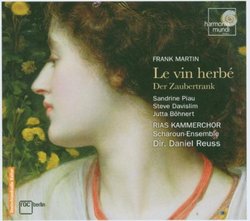Beautifully Sung and Played, Yet Not Fully Satisfying
Nicholas A. Deutsch | New York, NY USA | 02/09/2009
(4 out of 5 stars)
"Le Vin Herbe (1938-41) was the first major work by the great Swiss composer Frank Martin (1890-1974) in his fully mature musical language, a blend of German and French influences with a very personal use of elements of Schoenberg's 12-tone theory. The music for this retelling of the Tristan and Isolde myth is simultaneously Medieval and modern in feel, restrained and passionate, concise and expansive. Although the piece is accurately described as a "secular oratorio," its score is suffused with a clarity of insight into human existence, and a compassion for human suffering, that flow directly from Martin's deep Christian faith.
Martin wrote the work for 12 solo professional voices accompanied by 7 string instruments and piano; the 8 named characters - all important "movers" in the plot - are sung by individual members of the ensemble, who emerge from and then retreat into a small chorus which is constantly changing its size & composition, sometimes sounding like a 1-to-a-part madrigal group, sometimes like a full chamber choir. This above all is what gives Le Vin Herbe is unique, mysterious sound. And this is what we hear on the classic 1961 recording (Jecklin) with its good-to-excellent Francophone cast, conducted by Victor Desarzens, and with the composer at the piano.
But the unusual demands on the singers have tempted choir directors to reconfigure the distribution of voices into a conventional "soloists plus chorus" format, and the two subsequent recordings of the work both choose this route, with varying degrees of success. A 2000 Newport Classics issue showed the potential downside of such an adaptation: despite fine playing, good work from several soloists, solid conducting and excellent sound, its use of a largish amateur choir throughout flattened the subtle gradations of the original score to the point of courting monotony of texture, and few of the "minor" solos were projected with full conviction.
This new version is a different matter. For one thing, even at its largest the choir number only 2 dozen, just twice Martin's original complement; for another, conductor Daniel Reuss takes care to periodically reduce his forces to one-to-a-part, providing at least an element of variety in line with the original. And as far as the chorus, the 3 lead soloists and the instrumental ensemble go, it's hard to imagine Le Vin Herbe sung or played more beautifully. Indeed, sheer beauty of tone seems to have been a major goal here, and it's been reached. There is also scrupulous attention to Martin's dynamic markings, with careful distinction made between piano and pianissimo, between forte and fortissimo. What we might call the "Debussyist" component of the score - a shadowy, hushed, ravishingly lovely world - is superbly served.
But that's only part of Le Vin Herbe, and to my ears where the performance comes up short is in sustaining a consistent immersion in the drama. The story is all about characters who make crucial choices in their lives, but here there's a slightly passive quality to the characters. Soprano Sandrine Piau and especially tenor Steve Davislim both seem ready to grab hold of the verbal text, but the conducting supports their efforts only intermittently. And some of the crucial shorter roles - Iseult of the White Hands and Kaherdin in particular - barely register. Reuss gave us perhaps the most gorgeous recordings ever of Martin's Mass for Unaccompanied Double Choir and his Songs of Ariel, but there's a lack of instinctive feeling for drama here that leaves many stretches of the score underrealized, even a bit flat. Turn to the 1961 recording, and - despite rough patches in both singing and playing, plus far from ideal sound - every moment is alive to both the lyrical and the dramatic impulses in the music. (Not to mention the benefits of a fully Francophone cast.)
I write these comments not to discourage anyone from hearing this recording, but only to say: there's more to the piece. This is certainly the preferred modern recording, lovely to listen to and intermittently vivid as human drama; but if you have a chance to hear Desarzens, Martin and company, don't pass it up. And let's hope that at some future date someone will see fit to give us a new version that fulfills the composer's intentions both in letter and spirit.
"


 Track Listings (12) - Disc #1
Track Listings (12) - Disc #1